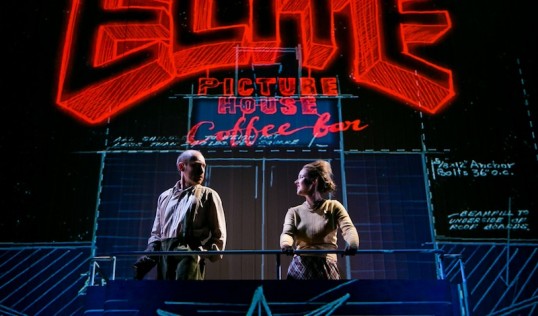Theatre in Scotland – A Field of Dreams
★★★★☆ Invaluable and illuminating
A book of reviews by Joyce McMillan edited by Philip Howard
Book review by Hugh Simpson
Remarkably consistent in quality and generosity of spirit, Joyce McMillan’s Theatre in Scotland – A Field of Dreams, edited by Philip Howard, is vital to anyone seeking to understand Scotland’s cultural life in the last 30 years.
Ranging from 1982 to 2015, this is a chronological collection of pieces – almost all theatre reviews – from the Sunday Standard, The Guardian, Scotland on Sunday and The Scotsman.

Lanark: Sandy Grierson and Jessica Hardwick. Photo Eoin Carey
Linked by economical background commentary, it travels from an exasperated notice from the Leslie Lawton era at the Lyceum that ‘never had any pretensions to intellectual respectability’, through to glowing reviews of Lanark and the wonderful Cox-Paterson Godot at the same venue.
This structure has the unfortunate effect of suggesting some kind of Whig history view of Scottish theatre as a process of inevitable improvement. While the proportion of positive reviews may well increase as time goes on, there is still room for the occasional hatchet job. Mark Thomson and Ian Rankin will surely not be pleased with the resurfacing of her description of Dark Road (another high-profile Lyceum production) as a ‘slow-motion car crash of theatrical bad taste, chaotic plotting and sheer, pointless nastiness’.
Fun as such savagery may be, it is in a definite minority here. Partly as bad productions do not linger in the memory and are not worth bringing up, but largely because McMillan understands better than anyone that constructive criticism is much more socially and culturally useful – if not always possible.
While not the conventional history a cursory glance at the title and cover may suggest, this book nevertheless functions as an extremely useful overview of the period. There are odd omissions – productions that are significant for historical or artistic reasons, from The Ship to Our Ladies of Perpetual Succour, are referred to but not represented themselves – but there is an extraordinary range here in time and space. Plays and careers are spotted early – even a largely dismissive review of David Greig’s Stalinland from 1993 prophesies ‘a brilliant career ahead.’
enviable consistency
It is impossible to imagine anyone else having seen all of these productions; it is equally difficult to imagine anyone else’s reviews being collected in such a way without embarrassing the author. While an enviable consistency in artistic judgement and political worldview is on display, there are none of the casual repetitions, lazy assumptions or lapses of judgement that would shame so many. As a result, it is certainly possible to read this book through, rather than dipping into it as most collected criticism would demand.

“The cultural cringe dies hard.” Daniel Cahill and Matthew Pidgeon in James III. Photo: Tommy Ga-Ken Wan
That consistency of approach is one of the most remarkable things here. Sometimes she goes very much against the grain, but, her points – drawn from careful observation and generous contemplation – are always worth considering.
Early on, there is the observation that ‘it would do Scottish theatres no harm if theatres were knocked flat,’ but this is not wholly the view of a young firebrand. It is born out of affection and frustration, very similar to the late John Fairgrieve’s demand that Tynecastle Park be turned into a car park during Hearts’ dark years in the early 80s.
And McMillan has mellowed little over the years. There is less explicit Politics with a capital ‘P’ as the years elapse, as she has had other outlets for such writing, but in many ways the writing becomes more politically charged. Questions of class, gender and sexuality are never far away. It is striking how often ‘erotic’ or ‘sexy’ is used as a term of appreciation of productions that depict the human condition in all its messy vibrancy.
While the ‘cycle of dawning cultural awareness followed by failure and forgetting’ described as Scotland’s lot early on may have improved, the fragility of lives under an austerity that also encompasses the arts is never far away. She rightly condemns the tiresome insistence on Scotland being a cold, small, rainy country, full of violence but lacking fruit, that drew easy laughs even in The James Plays. The cultural cringe dies hard.
strongest condemnation
Overall this is a thoroughly uplifting collection, reinforcing the reputation of a cultural gatekeeper but more importantly celebrating Scottish theatre. This is what is perhaps most noteworthy of all – that prejudices can be cast aside in a way few can manage. Indeed, she often reserves her strongest condemnation for productions whose political aims and values she obviously shares, but regards as lazy, unchallenging and lacking emotional depth, such as Wildcat’s Bedpan Alley.
Productions you are sure will be condemned as smugly middle-class and wrongheaded will suddenly be commended, with honesty of intentions and integrity of staging counting for more than philosophical underpinning – although this does not extend to Tom Stoppard, one of whose efforts makes her ‘feel vaguely ashamed of having any connection to theatre at all’.
What makes her views carry so much weight is this conviction that, in the end, they are less important than theatre. This is not because she considers it superior to other art forms – she is well aware of its drawbacks, and points them out regularly. It is also not for any theoretical, pretentious reasons, but because it can ‘change us a little, for good’.
A deeply felt belief in people’s capacity to change, to consider others’ viewpoints and to celebrate cultural differences without losing your own identity permeates this collection. It is a viewpoint that seems to be in very short supply at the moment, and is correspondingly desperately needed.
Theatre in Scotland – A Field of Dreams
by Joyce McMillan, edited by Philip Howard
Published by Nick Hern Books on 30 June 2016
ISBN: 978 1 84842 292 6
432 pages, £14.99 paperback
Available from www.nickhernbooks.co.uk with a 20% discount
Listing
Theatre in Scotland – Reflecting The Nation
The Traverse, 10 Cambridge Street, EH1 2ED
Wednesday 29 June at 7.30pm.
Joyce McMillan and Philip Howard are joined by Orla O’Loughlin (Artistic Director, Traverse Theatre), Mark Fisher (theatre journalist) and Allan Little (former BBC special correspondent, Chair of the Edinburgh International Book Festival) to “discuss the remarkable journey of modern Scottish theatre, and to explore the directions it might take in the years to come”.
Ticketholders will be able to buy Theatre in Scotland – A Field of Dreams at event at the special price of £10.
Tickets and details: www.traverse.co.uk
Joyce McMillan: Scottish Theatre’s Remarkable Journey
Edinburgh International Book Festival, Charlotte Square.
Tuesday 16 August 2016
One-off event: 3.30pm
Currently sold out but returns may be available nearer the time.
Details and tickets: www.edbookfest.co.uk
ENDS

















